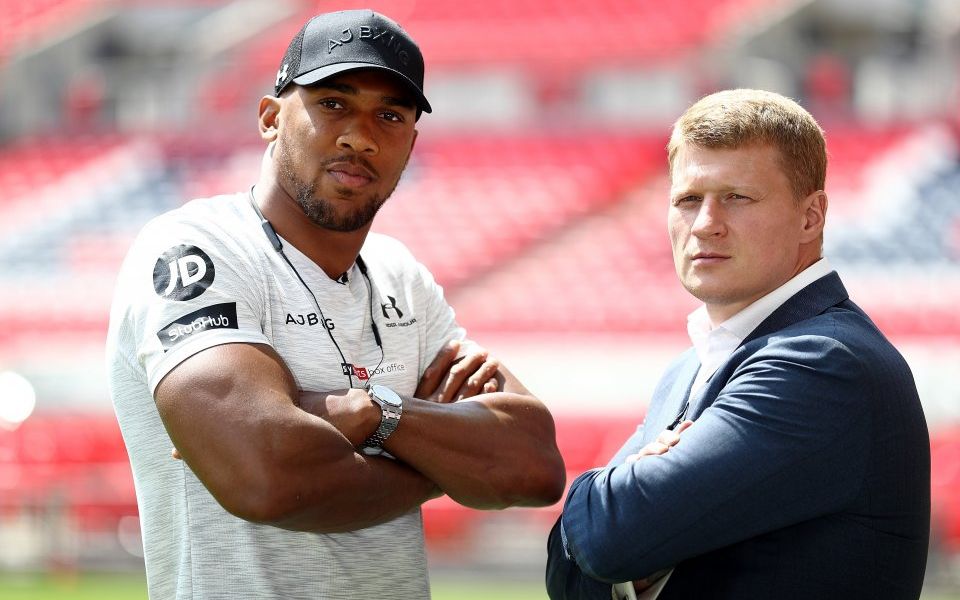Anthony Joshua v Alexander Povetkin: British boxer must overcome mandatory defence hurdle before regaining lost momentum

Since his comprehensive victory over former WBO heavyweight champion Joseph Parker in front of nearly 80,000 fans at the Principality Stadium in March, Anthony Joshua has not had everything his own way, despite now holding three of the four elite belts in his division.
In the past six months, a prospective bout with Deontay Wilder has hit the rocks, with both Joshua and his promoter Eddie Hearn being blamed in the fallout by a number of American fight fans. Supporters of Wilder accuse Joshua of greed in asking for 70 per cent of the purse, while Joshua's camp say Wilder wasn't interested in fighting and sought conflict over the terms to boost his own media profile.
Regardless of who is to blame, it certainly is a missed opportunity for Joshua. A contest with the American WBC world champion would have given him the chance to unify all the heavyweight belts and cement the Briton's legacy as one of the most decorated fighters in heavyweight history at the tender age of 28.
Read more: What mainstream sports can learn from KSI v Logan Paul
Meanwhile former world heavyweight champion Tyson Fury has finally returned to boxing after a protracted absence with typical modesty, accusing Joshua of avoiding Wilder in the ring and defining himself as the lineal world champion, as he remains unbeaten in the sport.
He has even organised his own match-up with Wilder in America later this year, expected to be in November or December. Fury knows that boxing is all about forging compelling stories and engaging narratives between fighters, and his bout with Wilder is far more fascinating to casual boxing fans than Joshua's upcoming mandatory defence against Alexander Povetkin this weekend.

Anthony Joshua holds three of boxing's four major heavyweight belts plus the IBO title (Source: Getty)
After signing an exclusive two-fight deal with Wembley Stadium, with the intention of opening up a pathway to defeat Wilder in April and get hold of the elusive WBC belt, Joshua's legacy-defining aspirations have been hit with the kind of compulsory defence most multiple-world champions are burdened with.
Joshua is no longer simply pursuing his dreams and chasing milestones, instead he is being hunted by boxers who know that defeating him means holding three of the sport's biggest belts. The pathway to glory has never been clearer to others in the heavyweight division, and the WBO has given Povetkin his chance this weekend to make history.
He has more than just a chance of victory too. Standing at 6ft 2in, Povetkin is a pressure fighter who specialises in countering the jab of taller opponents like Joshua with attacks from both hands. His punches are very heavy, and the 2004 Olympic gold medallist has even knocked out highly regarded contenders such as Manuel Charr, Carlos Takam, and David Price during a 35-match career – losing only once, against Ukrainian legend Wladimir Klitschko in 2013.
There is every possibility that he could trouble Joshua at Wembley on Saturday.
It wasn't a fight that Hearn wanted. Not only is Povetkin dangerous, but also his name isn't hugely marketable, especially after he failed two drug tests in 2016. Povetkin first tested positive for meldonium in May of that year before later exhibiting traces of the muscle-building drug ostarine in December. Tickets for Joshua's matches against Klitschko and Parker sold out with ease, but there will be empty seats at Wembley against Povetkin.

Deontay Wilder is the WBC heavyweight champion and has won 40 fights with 39 knockouts (Source: Getty)
“We have had to work a bit harder this time,” said Hearn. “Normally when you go on sale with an Anthony Joshua fight it just goes ‘ping’ but it has been slower than Wladimir Klitschko and Joseph Parker.”
“The only thing that aggravates me is that anyone in boxing I have spoken to says it is a tough fight, whereas the man on the street goes to me ‘When’s the Wilder fight?’. If Povetkin had come over and tried to nut Joshua at the press conference we would have sold out immediately. Instead there are a lot of people saying: ‘I will come in April for the Wilder fight',” he added.
Having started professional boxing after his gold medal success in London six years ago, Joshua has done everything asked of him. He has fought every top fighter aside from Wilder in the Ring magazine rankings, he has put on great performances against giants of the sport like Klitschko, and now holds four titles including three of the four major heavyweight belts.
"No one can compare to my record and what I've achieved right now. Name me another fighter that has done what I've done in 21 fights,” Joshua said.
This weekend provides Joshua his chance to reassert his rightful place as perhaps the current biggest name in boxing. If he can dominate Povetkin with the kind of exciting, hard-punching performance that gave him such success in the past, these past six months will be a mere afterthought when his career comes to an end.